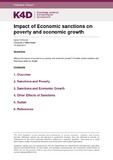| dc.contributor.author | O’Driscoll, Dylan | |
| dc.coverage.spatial | Sudan | en |
| dc.date.accessioned | 2017-07-20T15:36:34Z | |
| dc.date.available | 2017-07-20T15:36:34Z | |
| dc.date.issued | 2017-06-14 | |
| dc.identifier.citation | O’Driscoll, D. (2017). Impact of Economic sanctions on poverty and economic growth. K4D Helpdesk Report. Brighton, UK: Institute of Development Studies. | en |
| dc.identifier.uri | https://opendocs.ids.ac.uk/opendocs/handle/20.500.12413/13109 | |
| dc.description.abstract | The K4D helpdesk service provides brief summaries of current research, evidence, and lessons learned. Helpdesk reports are not rigorous or systematic reviews; they are intended to provide an introduction to the most important evidence related to a research question. They draw on a rapid desk-based review of published literature and consultation with subject specialists. Economic sanctions have become a popular tool in international politics, with the US being the largest actor in imposing sanctions. The aim of sanctions is to ensure government compliance with the imposer’s interests and are often viewed as more humane than military intervention. However, economic sanctions are also criticised for not achieving their objective and for having a negative impact on areas such as human rights, democracy, poverty, healthcare, and basic living conditions. This rapid review synthesises findings from rigorous academic, practitioner, and policy references, focusing on recent and seminal works with the aim of highlighting the impact of sanctions on poverty and economic development. This review examines the wider impact of sanctions globally in order to create a better understanding of the role that sanctions play in Sudan and to counteract the fact that there are minimal studies focused on the impact of sanctions in Sudan itself. It is important to note that the majority of studies on sanctions are quantitative and thus involve many case studies to prove an overriding theory and do not cover much specific detail. For this reason there are not many studies of the impact of sanctions on Sudan specifically, however there is data to be extracted on poverty and the economic growth, which can be contextualised using the quantitative studies. | en |
| dc.language.iso | en | en |
| dc.publisher | Institute of Development Studies | en |
| dc.relation.ispartofseries | K4D Helpdesk Report; | |
| dc.rights.uri | https://www.nationalarchives.gov.uk/doc/open-government-licence/version/3/ | en |
| dc.subject | Development Policy | en |
| dc.subject | Economics | en |
| dc.subject | Economic Development | en |
| dc.subject | Livelihoods | en |
| dc.subject | Poverty | en |
| dc.title | Impact of Economic sanctions on poverty and economic growth | en |
| dc.type | Helpdesk | en |
| dc.rights.holder | DFID | en |
| dcterms.dateAccepted | 2017-06-14 | |
| rioxxterms.funder | Default funder | en |
| rioxxterms.identifier.project | K4D | en |
| rioxxterms.version | NA | en |
| rioxxterms.funder.project | 0986883a-6d0f-4bb8-9c46-5e0682934d65 | en |

